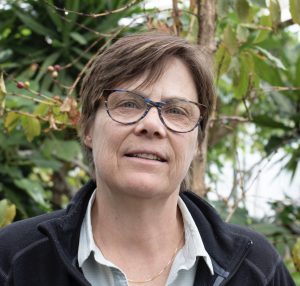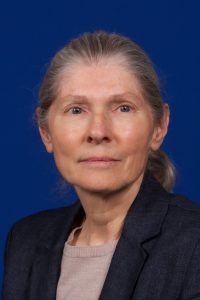Assessment Panel
The Assessment Panel will ensure that the AMR/AMU assessment is based on a comprehensive review of current and emerging evidence by analyzing trends, best practices, and existing policies in Canada and across the globe.
Panel members are appointed by the Chair. The selection criteria is based on expertise in various fields, including lived experience; credibility; and diversity. Diversity includes, amongst other things, gender, age, ethnicity, and regional representation.
Meet the Members:
 |
Janice (Jan) Sargeant, DVM, MSc, PhD, FCAHS
Dr. Jan Sargeant is an epidemiologist and food safety expert. She is a University Professor Emerita (University of Guelph), a Fellow of the Canadian Academy of Health Sciences and a former professor at the Ontario Veterinary College’s (OVC), University of Guelph, Department of Population Medicine. Dr. Sargeant has been recognized as a global leader in systematic reviews and research reporting guidelines. She is a co-lead and co-author of the REFLECT, PetSORT, and STROBE-Vet reporting guidelines for clinical trials and observational studies in animal populations. Her work focuses on zoonoses, diseases transmitted from animals to people, and microbial food safety, with particular interest in enhancing accessible and transparent animal research results, improving quality of information for therapeutic decision-making as well as data use in risk assessment and disease modelling. Recently, Dr. Sargeant conducted substantial knowledge synthesis work on antimicrobial use in farm animals. |
 |
Julie Arsenault, DVM, MSc, PhD
Dr. Julie Arsenault is a full professor of veterinary epidemiology at the Faculty of Veterinary Medicine of the Université de Montréal. Her research interests include the use of advanced epidemiological methods for investigating risk factors and impacts of infectious and zoonotic diseases in small ruminants and other farm animals. She is also interested in the quantification of antimicrobial use based on different indicators and on the analysis of factors contributing to the development and spread of resistant bacteria. |
 |
Herman Barkema, DVM, PhD, FCAHS
Dr. Herman Barkema is a Professor in Epidemiology of Infectious Diseases at the Faculty of Veterinary Medicine of the University of Calgary, with a joint appointment at the Cumming School of Medicine. He is a United Nations University Chair in Infectious Diseases in a Changing Climate. Dr. Barkema’s research program focuses on prevention and control of infectious diseases in livestock and humans, including antimicrobial resistance. He is the most highly cited researcher worldwide in cattle diseases. Dr. Barkema leads the Antimicrobial Resistance – One Health Consortium, and One Health at UCalgary. He is a fellow of the Canadian Academy of Health Sciences. |
 |
Sylvia Checkley, DVM, PhD
Dr. Sylvia Checkley is a veterinary epidemiologist and professor at the University of Calgary, Faculty of Veterinary Medicine (UCVM). Her research is focused on One Health approaches to surveillance and investigation of complex problems at the interface of humans, animals, and their environment, with a special interest in surveillance and modelling of antimicrobial use, resistance, and stewardship across the livestock production continuum. She also has years of experience working in rural community veterinary practice, developing animal health surveillance and disease investigation programs at Alberta Agriculture, and developing surveillance tools for water quality assessment at the Alberta Provincial Laboratory for Public Health. |
 |
Anne Deckert, DVM, MSc, PhD
Dr. Anne Deckert is an Assistant Professor in the Department of Population Medicine at the University of Guelph. She was a veterinary epidemiologist with the Canadian Integrated Program for Antimicrobial Resistance Surveillance (CIPARS) at the Public Health Agency of Canada for over 20 years. Anne has also worked as a consultant for FAO and WHO on antimicrobial use and resistance surveillance projects in Central Asia. Her research interests with respect to antimicrobial use and resistance include the relationships between antimicrobial resistance and antimicrobial use, antimicrobial use metrics, antimicrobial resistance and stewardship in livestock, and knowledge translation strategies. |
 |
David Kelton, DVM, PhD, FCAHS
Dr. David Kelton is a retired professor of veterinary epidemiology and held the Dairy Farmers of Ontario Dairy Cattle Health Research Chair at the University of Guelph for 10 years. He is a founding member of Canadian Mastitis Network and Dairy at Guelph, a past-president of the National Mastitis Council, and the Chair of the International Dairy Federation Standing Committee on Animal Health and Welfare. He has co-authored more than 300 manuscripts focused on infectious disease surveillance and control, and dairy cattle welfare. His recent work has focused on antimicrobial use and resistance, using a One Health approach that embraces transdisciplinary collaboration. |
 |
Mr. Tim Nelson
Mr. Nelson has dedicated his career to the livestock and poultry industries in the UK, Australia and Canada. He’s spent 30 years developing and leading farmer-funded NGO research organizations. Mr. Nelson was the CEO of the Livestock Research Innovation Corporation (LRIC) and is the founder and CIO of Farm Health Guardian (FHG), dedicated to using technology to develop biosecurity solutions to livestock diseases. He is also currently the Executive Director of PigGen Canada. His research focus is in developing and implementing participatory research programs, particularly those involving Public Private Partnerships. |
 |
Lindsay Nicolle, MD, FRCPC, FCAHS
Dr. Lindsay Nicolle is a Professor Emeritus in the Rady Faculty of Health Sciences at the University of Manitoba, was previously Chair of the Department of Internal Medicine, and currently chairs the Biomedical Research Ethics Board. Her research interests have included UTIs, infections in long-term care facilities, antimicrobial resistance, and healthcare-acquired infections. She has participated in the development of many professional practice guidelines addressing healthcare-acquired infections and infectious diseases. Dr. Nicolle is a Fellow of the Society of Hospital Epidemiologists of America, the Infectious Diseases Society of America, the Canadian Academy of Health Sciences and AMMI Canada. She chaired the Steering Committee for Infection Control Guidelines of the Laboratory Centre for Disease Control during 1985–2005. She was also a member of the Canadian Drug Expert Committee of the Common Drug Review from 2004 to 2017, and chaired the committee from 2012-2017. |
 |
Simon Otto, PhD, DVM
Dr. Simon Otto is an Associate Professor in the University of Alberta School of Public Health and is the lead of the HEAT-AMR (Human-Environment-Animal Transdisciplinary Antimicrobial Resistance) Research Group (www.heat-amr.com). He is a veterinarian and epidemiologist whose research investigates the One Health epidemiology of AMR. HEAT-AMR focuses on integrated antimicrobial use and resistance surveillance, diagnostic testing, and stakeholder engagement using quantitative and qualitative approaches to inform and support realistic strategies for antimicrobial stewardship using a One Health approach. He is also the Thematic Area Lead for Healthy Environments in the Centre for Healthy Communities at the School of Public Health. |
 |
David Patrick, MC, FRCPC, MHSc
Dr. David Patrick is an infectious diseases specialist and epidemiologist with a career interest in responding to emerging infectious diseases. He is a Professor in the School of Population and Public Health at the University of British Columbia (UBC) and directs the research program at the British Columbia Centre for Disease Control. He has published over 250 papers on topics ranging from HIV to COVID-19. His main research focuses on containing the threat of antimicrobial resistance and understanding the connection between antibiotic use and atopic disease (such as asthma) in populations. |
 |
Andrew Potter, PhD, SOM, FCAHS
Dr. Potter is a graduate of Carleton University and the University of Otago and he worked at the Vaccine and Infectious Disease Organization (VIDO), University of Saskatchewan, for 34 years serving as a research scientist, Associate Director and Director and CEO, retiring from that position at the end of 2018. He was also a Professor in the Department of Veterinary Microbiology at WCVM, University of Saskatchewan, retiring from that position in 2021. His primary research interests are in the areas of the pathogenesis of bacterial respiratory diseases and the development of vaccine technologies for humans and animals. |
 |
John Prescott, VetMB, PhD, FCAHS
Dr. Prescott is University Professor Emeritus from the University of Guelph, where he was Chair, Department of Pathobiology, 2003-2008. He has very diverse interests in bacterial infections in animals but is best known for work on Rhodococcus equi pneumonia in foals and in promoting better use of antimicrobial drug use in animals. He is the originator, editor and an author of the text “Antimicrobial Therapy in Veterinary Medicine,” now going into its sixth edition. He was a member of the Council of Canadian Academies Expert Panel on the potential socio-economic impacts of AMR in Canada. |
 |
Javier Sanchez, DVM, PhD
Dr. Javier Sanchez is a veterinary epidemiologist. He is currently the Director of the Centre for Veterinary Epidemiological Research at the Atlantic Veterinary College and Professor of Epidemiology at the University of Prince Edward Island. Dr. Sanchez’s expertise is in the area of quantitative methods in epidemiology. He has led numerous multidisciplinary projects in the area of food safety, public health, and One Health. More recently he led the development of the Canadian network for antimicrobial stewardship and resistance in dairy farms in Canada (CadNet-ASR) which now has been successfully incorporated into the national surveillance program, CIPARS. Dr. Sanchez is recognized around the world and has participated in many training and research programs, mainly in Latin America. |
 |
Cheryl Waldner, DVM, PhD, FCAHS
Dr. Cheryl Waldner is a professor of epidemiology and research chair from the University of Saskatchewan. Her transdisciplinary work has informed antimicrobial stewardship and surveillance, water quality and health, farm-to-fork management of food safety, and public health pandemic forecasting and planning. Her current research is focused on the use of system science tools, including system dynamics and agent-based models, to understand the impact of rapid diagnostics and infection prevention measures on enhancing antimicrobial stewardship and infection prevention and control. She is widely recognized for her expertise in factors affecting the productivity of cow-calf herds and the investigation of disease outbreaks. |
 |
Scott Weese, DVM, DVSc, DACVIM, FCAHS
Dr. Scott Weese is a veterinary internist, a Diplomate of the American College of Veterinary Internal Medicine, and a Fellow of the Canadian Academy of Health Sciences. He is a Professor at the Ontario Veterinary College, University of Guelph, Director of the University of Guelph Centre for Public Health and Zoonoses, Chief of Infection Control at the Ontario Veterinary College Health Sciences Centre, and is a member of the Quadripartite Global Leaders Group on AMR and Chair of the WHO Advisory Group for Critically Important Antimicrobials in Human Medicine. He runs the infectious disease website WormsAndGerms Blog. |
